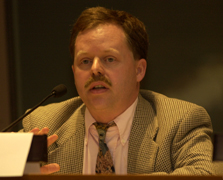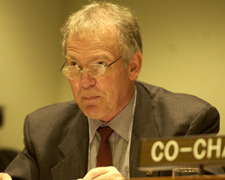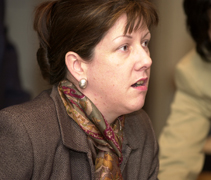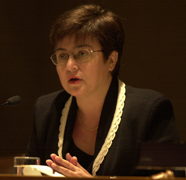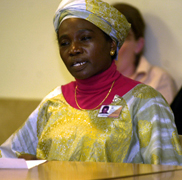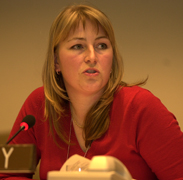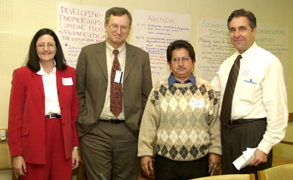|
|
|||||||||||||||||||||||||||||||||||||||||||||
|
|||||||||||||||||||||||||||||||||||||||||||||
|
Events convened on Wednesday, 27 March 2002 |
|
|
International
environmental governance: Proposals for reform
Werner Obermeyer, UNEP, outlined conclusions reached by UNEP's IEG process, including on: a greater policy advisory role for UNEP's Governing Council; increased civil society participation; closer inter-agency cooperation and improved implementation of coordinated work programmes throughout the UN system; and enhanced synergies and coordination among MEAs. Steve Charnovitz,
Wilmer, Cutler & Pickering, noted the perception that the existing
environment regime is poly-centric, incoherent and ill-equipped to deal
with global environmental problems, and said although a global environment
organization is ultimately needed, the WTO is not an appropriate model.
Emphasizing that NGO participation adds legitimacy and expertise, he
stressed the need for more organized venues for NGOs to contribute within
the UN system. Peter Haas,
University of Massachusetts, outlined the principle functions that a
governance system should perform: issue linkage; monitoring and early
warning; rule making; norm development; policy verification; enforcement;
capacity building; environmental advocacy at the WTO; and financing. He
stressed the need to inventory what institutions are performing these
functions and to assess how they can be better coordinated and improved,
and emphasized that decentralization is the appropriate institutional
design to address complex systems such as IEG. He suggested that the role
of a global environment organization would include advocating
environmental issues at the WTO and providing institutional support for
clustering MEAs. Joost Pauwelyn, WTO, discussed the need for a judicial mechanism for international environmental law, such as a world environment court, in which many MEAs could be enforced before one environmental tribunal. He said existing tribunals could be useful, but their remedies would need to be adapted to focus on enforcement mechanisms specific to the environment.
|
|
Sustainable human settlements: Issues of good governance Presented by the NGO Committee on Human Settlements and the Commonwealth Human Ecology Council in association with the Commonwealth Consultative Group on Human Settlements
Jochen Eigen, UN Human Settlements Programme, outlined three main issues in the Habitat Agenda: the crucial contribution of cities to sustainable development; the need to improve cities' planning and management capacities; and the need to promote the efficiency of international support for local capacity building.
Swati
Raut, Safe Bombay Community, stressed that good local governance must be
built on adequate infrastructure, citing local initiatives in Bombay. John Langmore, International Labor Organization, stressed that employment is central to sustainable development. He emphasized the importance of ensuring continued growth of employment in the service sector, which could help to reconcile environmental and development goals.
|
|
The rural energy challenge: Meeting the needs of the poor Presented by UNDESA and UNDP
J. Gururaja, UNDESA, said that technologies are already available for rural energy service provision. He called for short-term targeted subsidies to support the basic energy needs of the poor, and long-term energy commercialization. Dominique Lallement, World Bank, and Judy Siegel, Winrock International, outlined a proposed Global Village Energy Partnership, incorporating energy stakeholders and other development partners, to address implementation of modern energy service provision and to support the Millennium Development Goals. Susan McDade, UNDP, noted agreement on challenges within the energy community, and stressed the need to focus on implementation. She presented advantages of liquefied petroleum gas (LPG) in meeting heating and cooking needs cleanly and economically. Cahit Gürkök, UNIDO, and Sandile Tyatya, South African Department of Mines and Energy, shared experiences with renewable and alternative energy projects and infrastructure programmes. Emmanuel Chantelot, LP Gas Association, described the LPG industry's success in providing a widely used clean energy source.
|
|
Linking poverty reduction and environmental management: Policy challenges and opportunities Presented by UNDP, the UK Department for International Development (DFID), the European Commission (EC) and the World Bank
Kristalina Georgieva, World Bank, explained that the paper highlights the
need to move beyond narrow environmental management by employing cross-sectoral
solutions, and to view the environment as a solution rather than a
constraint to development. The paper identifies policy opportunities to
reduce poverty and improve the environment, including improving
governance, protecting and expanding the assets of the poor, and focusing
on the quality of growth. Another opportunity identified is reforming
international policies by, inter alia: enhancing access to OECD markets
for developing countries; capitalizing on environmental standards to build
capacity and market access; providing new and additional funding for the
protection of global public goods; and mainstreaming the environment into
poverty reduction by donors. The paper concludes that it is unnecessary to
sacrifice the environment for economic growth; better environmental
management is crucial for poverty reduction; and the WSSD provides an
important opportunity to forge a set of coherent actions.
|
|
Findings and lessons: Mining, minerals and sustainable development Presented by International Institute for Environment and Development (IIED) and the World Business Council on Sustainable Development (WBCSD) Richard Sandbrook, Mining, Minerals and Sustainable Development (MMSD), described the MMSD process and its mandate to examine how the mining and minerals sector can contribute to sustainable development. He noted that while initial implementation process goals recognized social, environmental and economic issues, the process revealed a need to incorporate governance at a fundamental level.
Manuel Pulgar-Vidal, Sociedad Peruana de Derecho Ambiental, described the combative spirit in which mining operations and communities interact, stressing the need to adopt a more constructive attitude. Daniel Limpitlaw, University of Witwatersrand, highlighted governance as a key cross-cutting issue that emerged from the MMSD process, in addition to poverty alleviation, job creation, and lack of capacity. Namakau Kaingu, SADC Women in Mining Trust, noted that poverty alleviation is needed to address causes of the often environmentally damaging practice of small-scale mining. Wanda Hoskin, UNEP, solicited comments on a draft proposal for a new Global Forum on Mining, Minerals and Metals, which would act as a venue for further dialogue on sustainable development within this sector. The proposed forum could promote dialogue, facilitate the implementation of recommendations, and develop information knowledge networks.
|
|
Decoupling economic growth from environmental degradation through eco-efficiency Presented by the Governments of Denmark, Finland, Norway and Sweden
Mikko Jalas, Helsinki School of Economics, explored the potential of product services and information communication technologies for decoupling, and stressed the need for both eco-efficiency and structural changes. Helen Ågren, Swedish Environmental Protection Agency, explained that integrated product policy is a framework to minimize environmental impacts of economic growth by integrating sustainable development in all types of products and services. Sven-Olof Ryding, Swedish Environmental Management Council, presented environmental product declarations (EPDs) as a tool to facilitate sustainable production and consumption, and called for harmonization of EPDs internationally. Tormod Lien, Nordic Eco-labelling, highlighted the success of the Nordic Eco-label, and called for global coordination and cooperation in promoting eco-labelling based on scientific and transparent processes, mutual recognition, and consideration of international trade concerns. Amb. Viveka Bohn, Swedish Ministry for Foreign Affairs, presented the Nordic countries' proposal that the WSSD endorse a ten-year global work programme on decoupling, focused on product-oriented initiatives. Discussion: Many participants supported the proposal for a work programme and offered their cooperation. Others emphasized consumers' role in decoupling and highlighted unintended consequences of product policies.
|
|
Food security and wild biodiversity: A new partnership Presented by IUCN, Future Harvest, the Equator Initiative, UNDP and partners
Jeff McNeely, IUCN, outlined the challenge of conserving biodiversity while addressing the needs of the rural poor, who live among some of the world's richest biodiversity. Sara Scherr, University of Maryland, described ecoagriculture and outlined strategies to enable farmers to be conservationists, including improved land tenure and redirection of agricultural subsidies. Walter Rodriquez Vargas, Association of Small Farmers of Talamanca, Costa Rica, described how organic agriculture involving numerous tree crops has significantly increased wildlife populations, particularly birds. Participants stressed the need for
the WSSD to address the linkage between food security and wild
biodiversity.
|
|
|
|
|
The Earth Negotiations Bulletin (ENB) on the Side is a special publication
of the International Institute for Sustainable Development (IISD) in
cooperation with the United Nations Development Programme (UNDP). The Editor
of ENB on the Side is Kira Schmidt
kira@iisd.org
|
|
|
|
| © 2002, IISD. All rights reserved. |
|


